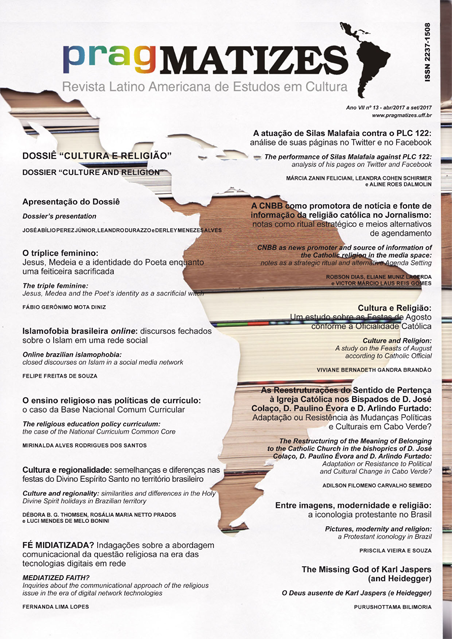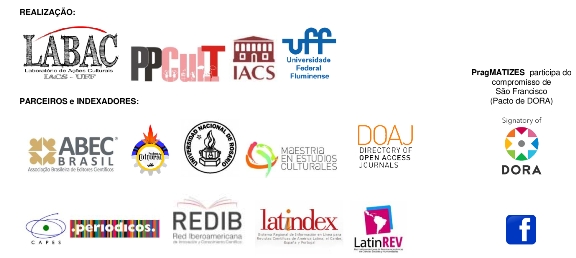CNBB as news promoter and source of information of the Catholic religion in the media space: notes as a strategic ritual and alternative Agenda Setting
DOI:
https://doi.org/10.22409/pragmatizes.v0i13.10463Abstract
This paper investigates the empirical material, documentary, through content analysis: alternative means of notes and media scheduling (1968-1977) made by the Conference of Bishops of Brazil (CNBB), during the period of military dictatorship in Brazil. The analysis takes into account, thematically, five cases of religious accused by the state to practice subversive activities, published in Folha de S. Paulo, Jornal do Brazil, O Estado de S. Paulo and O Globo. The goal is to rescue the CNBB as an actor in the news production process (Molotch and LESTER, 1999), in addition to actions taken by the organization to news promoters (advisors, organizations) to relate the news assemblers (reporters, editors, redactions) negotiating senses to be offered on the news the couple news Consumers (readership). Much more than source of news in the public space and media space, the CNBB participated actively in favor of citizenship in favor of the struggle for human rights.Downloads
References
FOLHA DE S. PAULO. Governo expulsa do País o pe. Jentel. 16/12/1975.
FOLHA DE S. PAULO. Lorscheider denuncia. 30/07/77.
JORNAL DO BRASIL. D. Agnelo só quer Direitos Humanos. 11/11/1969.
JORNAL DO BRASIL. Comissão da CNBB examina trabalho de padre suíço e deverá dar-lhe endosso. 22/07/1977.
JORNAL DO BRASIL. Secretário da CNBB diz que o caso dos padres caminha para o esclarecimento. 11/12/68.
JORNAL DO BRASIL. Sem Título. 5/11/1969.
HACKETT, Robert. Declínio de um paradigma? A parcialidade e a objetividade nos media noticiosos, in TRAQUINA, Nelson (org.) Jornalismo: questões, teorias e estórias'. Lisboa, Vega, 1999.
HALL, Stuart et al. A produção social das notícias: O mugging nos media. In: TRAQUINA, Nelson. Jornalismo: questões, teorias e 'estórias'. 2.ed. p.224-248. Lisboa: Vega, 1999.
LACERDA, Eliane Muniz. O jornalismo nos limites da liberdade: um estudo da cobertura da imprensa sobre os casos dos religiosos acusados de praticar atividades subversivas durante o regime militar. 2007. 137 f. Dissertação (Mestrado em Comunicação)- Universidade de Brasília, Brasília, 2007.
LORSCHEDER, Dom Aloísio. Entrevista realizada em outubro de 2006.
MOLOTCH, Harvey e LESTER Marilyn. As notícias como procedimento intencional: acerca do uso estratégico dos acontecimentos de rotina, acidentes e escândalos. In: TRAQUINA, Nelson (org.) Jornalismo: Questões, teorias, estórias. Lisboa (Portugal) Vega. 1999.
MOTTA, Luiz Gonzaga. Pesquisa em jornalismo no Brasil: o confronto entre os paradigmas midiacêntrico e sociocêntrico. Comunicação apresentada no Congresso da IAMCR. Porto Alegre, 2004.
MENDES, Dom Luciano. Entrevista realizada em maio de 2006.
MARCONI, Paolo. A censura política na imprensa brasileira. São Paulo: Global, 1980.
MCCOMBS, Mawell E.; SHAW, Donald L. A evolução da pesquisa sobre o agendamento: vinte e cinco anos no Mercado das idéias. In: TRAQUINA, Nelson. O Poder do Jornalismo: Análise e Textos da Teoria do Agendamento. p.125-134. Coimbra: Minerva, 2000.
MOLOTCH, Harvey; LESTER, Marilyn. As notícias como procedimento intencional: acerca do uso estratégico de acontecimentos de rotina, acidentes e escândalos. In: TRAQUINA, Nelson. Jornalismo: questões, teorias e 'estórias'. 2.ed. p.34-51. Lisboa: Vega, 1999.
O ESTADO DE S. PAULO. Igreja aguarda prova de culpa. 6/12/69. O ESTADO DE S. PAULO. Paris intercede pelos sacerdotes. 7/11/68. O GLOBO. D. Agnelo apoia arcebispo. 11/12/68.
O GLOBO. Ministério nega estudo para expulsão de bispo. 2/08/77.
O GLOBO. Camargo nega expulsão de Casaldáliga. 30/07/77.
TUCHMAN, Gaye. La producción de la noticia. Barcelona: GG, 1983.
UCHOA, Pe. Vigílio. Entrevista realizada em novembro de 2005.
Downloads
Published
How to Cite
Issue
Section
License
By forwarding an original to PragMATIZES, the authors agree that the copyright related to it is transferred to the Publishing. Articles and other writings are made available in PDF format from their publication, and they can be downloaded to institutional repositories and personal pages, provided that with their proper bibliographic indication.



